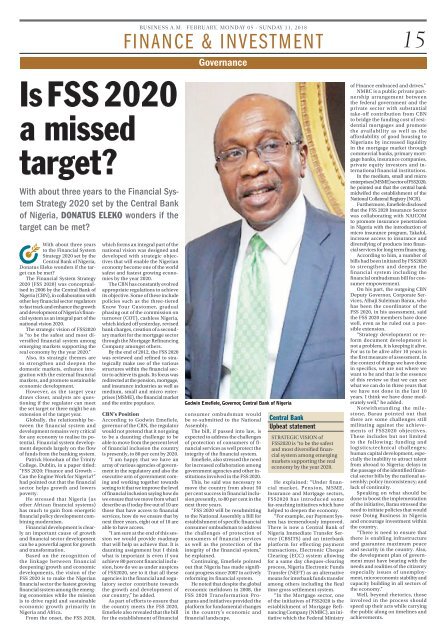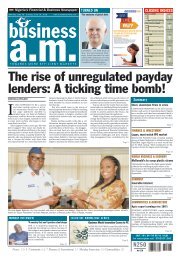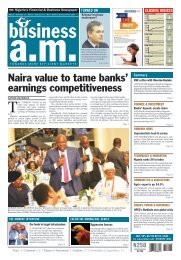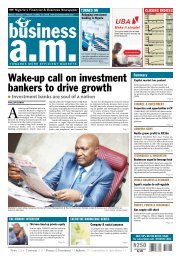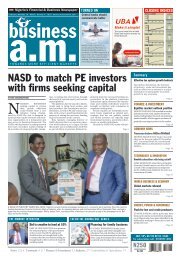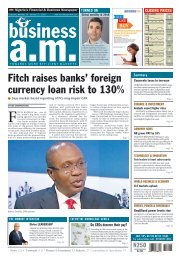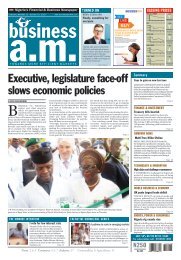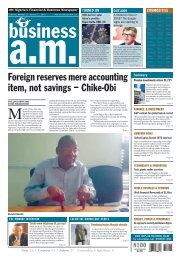You also want an ePaper? Increase the reach of your titles
YUMPU automatically turns print PDFs into web optimized ePapers that Google loves.
BUSINESS A.M. FEBRUARY, MONDAY <strong>05</strong> - SUNDAY 11, 20<strong>18</strong><br />
FINANCE & INVESTMENT<br />
15<br />
Governance<br />
Is FSS 2<strong>02</strong>0<br />
a missed<br />
target?<br />
With about three years to the Financial System<br />
Strategy 2<strong>02</strong>0 set by the Central Bank<br />
of Nigeria, DONATUS ELEKO wonders if the<br />
target can be met?<br />
With about three years<br />
to the Financial System<br />
Strategy 2<strong>02</strong>0 set by the<br />
Central Bank of Nigeria,<br />
Donatus Eleko wonders if the target<br />
can be met?<br />
The Financial System Strategy<br />
2<strong>02</strong>0 (FSS 2<strong>02</strong>0) was conceptualised<br />
in 2006 by the Central Bank of<br />
Nigeria (CBN), in collaboration with<br />
other key financial sector regulators<br />
to fast track and enhance the growth<br />
and development of Nigeria’s financial<br />
system as an integral part of the<br />
national vision 2<strong>02</strong>0.<br />
The strategic vision of FSS2<strong>02</strong>0<br />
is “to be the safest and most diversified<br />
financial system among<br />
emerging markets supporting the<br />
real economy by the year 2<strong>02</strong>0.”<br />
Also, its strategic themes are<br />
to strengthen and deepen the<br />
domestic markets, enhance integration<br />
with the external financial<br />
markets, and promote sustainable<br />
economic development.<br />
However, as the target year<br />
draws closer, analysts are questioning<br />
if the regulator can meet<br />
the set target or there might be an<br />
extension of the target year.<br />
Globally, the relationship between<br />
the financial system and<br />
development remains very critical<br />
for any economy to realise its potential.<br />
Financial system development<br />
depends largely on the flow<br />
of funds from the banking system.<br />
Patrick Honohan of the Trinity<br />
College, Dublin, in a paper titled:<br />
“FSS 2<strong>02</strong>0: Finance and Growth –<br />
Can the Engine Work for Nigeria?”<br />
had pointed out that the financial<br />
sector helps growth and lowers<br />
poverty.<br />
He stressed that Nigeria (as<br />
other African financial systems)<br />
has much to gain from energetic<br />
financial policy development combining<br />
modernism.<br />
Financial development is clearly<br />
an important cause of growth<br />
and financial sector development<br />
can be a powerful agent for growth<br />
and transformation.<br />
Based on the recognition of<br />
the linkage between financial<br />
deepening/growth and economic<br />
developments, the vision of the<br />
FSS 2<strong>02</strong>0 is to make the Nigerian<br />
financial sector the fastest growing<br />
financial system among the emerging<br />
economies while the mission<br />
is to drive rapid and sustainable<br />
economic growth primarily in<br />
Nigeria and Africa.<br />
From the onset, the FSS 2<strong>02</strong>0,<br />
which forms an integral part of the<br />
national vision was designed and<br />
developed with strategic objectives<br />
that will enable the Nigerian<br />
economy become one of the world<br />
safest and fastest growing economies<br />
by the year 2<strong>02</strong>0.<br />
The CBN has constantly evolved<br />
appropriate regulations to achieve<br />
its objective. Some of these include<br />
policies such as the three-tiered<br />
Know Your Customer, gradual<br />
phasing out of the commission on<br />
turnover (COT), cashless Nigeria,<br />
which kicked off yesterday, revised<br />
bank charges, creation of a secondary<br />
market for the mortgage sector<br />
through the Mortgage Refinancing<br />
Company amongst others.<br />
By the end of 2012, the FSS 2<strong>02</strong>0<br />
was reviewed and refined to strategically<br />
make use of the various<br />
structures within the financial sector<br />
to achieve its goals. Its focus was<br />
redirected at the pension, mortgage,<br />
and insurance industries as well as<br />
medium, small and micro enterprises<br />
(MSME), the financial market<br />
and the entire populace.<br />
CBN’s Position<br />
According to Godwin Emefiele,<br />
governor of the CBN, the regulator<br />
would not pretend that it not going<br />
to be a daunting challenge to be<br />
able to move from the percent level<br />
of financial inclusion the country<br />
is presently, to 80 per cent by 2<strong>02</strong>0.<br />
“I am happy that we have an<br />
array of various agencies of government<br />
in the regulatory and also the<br />
executive arm of government coming<br />
and working together towards<br />
seeing to it that we improve the level<br />
of financial inclusion saying how do<br />
we ensure that we move from what I<br />
describe as if today five out of 10 are<br />
those that have access to financial<br />
services, how do we ensure that by<br />
next three years, eight out of 10 are<br />
able to have access.<br />
“I am sure at the end of this session<br />
we would provide roadmap<br />
that will help us achieve that. It is<br />
daunting assignment but I think<br />
what is important is even if you<br />
achieve 80 percent financial inclusion,<br />
how do we as under auspices<br />
of FSS2<strong>02</strong>0, see to it that all these<br />
agencies in the financial and regulatory<br />
sector contribute towards<br />
the growth and development of<br />
our country,” he added.<br />
As part of efforts to ensure that<br />
the country meets the FSS 2<strong>02</strong>0,<br />
Emefiele also revealed that the bill<br />
for the establishment of financial<br />
Godwin Emefiele, Governor, Central Bank of Nigeria<br />
consumer ombudsman would<br />
be re-submitted to the National<br />
Assembly.<br />
The bill, if passed into law, is<br />
expected to address the challenges<br />
of protection of consumers of financial<br />
services as well protect the<br />
integrity of the financial system.<br />
Emefiele, also stressed the need<br />
for increased collaboration among<br />
government agencies and other institutions<br />
involved in the FSS 2<strong>02</strong>0.<br />
This, he said was necessary to<br />
move the country from about 50<br />
per cent success in financial inclusion<br />
presently, to 80 per cent in the<br />
next three years.<br />
“FSS 2<strong>02</strong>0 will be resubmitting<br />
to the National Assembly a Bill for<br />
establishment of specific financial<br />
consumer ombudsman to address<br />
the challenges of protection of<br />
consumers of financial services<br />
as well as the protection of the<br />
integrity of the financial system,”<br />
he explained.<br />
Continuing, Emefiele pointed<br />
out that Nigeria has made significant<br />
progress since 2007 in actively<br />
reforming its financial system.<br />
He noted that despite the global<br />
economic meltdown in 2008, the<br />
FSS 2<strong>02</strong>0 Transformation Programs<br />
and initiatives provided the<br />
platform for fundamental changes<br />
in the country’s economic and<br />
financial landscape.<br />
Central Bank<br />
Upbeat statement<br />
STRATEGIC VISION of<br />
FSS2<strong>02</strong>0 is “to be the safest<br />
and most diversified financial<br />
system among emerging<br />
markets supporting the real<br />
economy by the year 2<strong>02</strong>0.<br />
He explained: “Under financial<br />
market, Pension, MSME,<br />
Insurance and Mortgage sectors,<br />
FSS2<strong>02</strong>0 has introduced some<br />
far-reaching initiatives which have<br />
helped to deepen the economy.<br />
“For example, our Payment System<br />
has tremendously improved.<br />
There is now a Central Bank of<br />
Nigeria Immediate Transfer Service<br />
(CBSITS) and an interbank<br />
platform for effecting payment<br />
transactions, Electronic Cheque<br />
Clearing (ECC) system allowing<br />
for a same day cheques-clearing<br />
process, Nigeria Electronic Funds<br />
Transfer (NEFT) as an alternative<br />
means for interbank funds transfer<br />
among others including the Real<br />
time gross settlement system.<br />
“In the Mortgage sector, one<br />
of the initiatives of FSS2<strong>02</strong>0 is the<br />
establishment of Mortgage Refinancing<br />
Company (NMRC), an initiative<br />
which the Federal Ministry<br />
of Finance embraced and drives.”<br />
NMRC is a public private partnership<br />
arrangement between<br />
the federal government and the<br />
private sector with substantial<br />
take-off contribution from CBN<br />
to bridge the funding cost of residential<br />
mortgages and promote<br />
the availability as well as the<br />
affordability of good housing to<br />
Nigerians by increased liquidity<br />
in the mortgage market through<br />
commercial banks, primary mortgage<br />
banks, insurance companies,<br />
private equity investors and international<br />
financial institutions.<br />
In the medium, small and micro<br />
enterprises (MSME) sector of FSS2<strong>02</strong>0,<br />
he pointed out that the central bank<br />
midwifed the establishment of the<br />
National Collateral Registry (NCR).<br />
Furthermore, Emefiele disclosed<br />
that the FSS 2<strong>02</strong>0 Insurance Sector<br />
was collaborating with NAICOM<br />
to promote insurance penetration<br />
in Nigeria with the introduction of<br />
micro insurance program, Takaful,<br />
increase access to insurance and<br />
diversifying of products into financial<br />
services for long term financing.<br />
According to him, a number of<br />
bills had been initiated by FSS2<strong>02</strong>0<br />
to strengthen and deepen the<br />
financial system including the<br />
financial ombudsman bill for consumer<br />
empowerment.<br />
On his part, the outgoing CBN<br />
Deputy Governor, Corporate Services,<br />
Alhaji Suleiman Barau, who<br />
has been the coordinator of the<br />
FSS 2<strong>02</strong>0, in his assessment, said<br />
the FSS 2<strong>02</strong>0 members have done<br />
well, even as he ruled out a possible<br />
extension.<br />
“Strategy development or reform<br />
document development is<br />
not a problem, it is keeping it alive.<br />
For us to be alive after 10 years is<br />
the first measure of assessment. In<br />
the context of things we have done<br />
in specifics, we are not where we<br />
want to be and that is the essence<br />
of this review so that we can see<br />
what we can do in three years that<br />
we have not done in the last 10<br />
years. I think we have done moderately<br />
well,” he added.<br />
Notwithstanding the milestone,<br />
Barau pointed out that<br />
there are some challenges still<br />
militating against the achievements<br />
of FSS2<strong>02</strong>0 objectives.<br />
These includes but not limited<br />
to the following: funding and<br />
logistics;technical challenges;<br />
human capital development, especially<br />
the inability to attract talent<br />
from abroad to Nigeria; delays in<br />
the passage of the identified financial<br />
sector bills by the national assembly;<br />
policy inconsistency; and<br />
lack of continuity.<br />
Speaking on what should be<br />
done to boost the implementation<br />
of the initiative, Barau stressed the<br />
need to initiate policies that would<br />
ease Doing Business in Nigeria<br />
and encourage investment within<br />
the country.<br />
“There is need to ensure that<br />
there is enabling infrastructure<br />
and guarantee maximum peace<br />
and security in the country. Also,<br />
the development plan of government<br />
must have bearing with the<br />
needs and realities of the citizenry<br />
especially issues of unemployment,<br />
microeconomic stability and<br />
capacity building in all sectors of<br />
the economy.”<br />
Well, beyond rhetorics, those<br />
involved in the process should<br />
speed up their acts while carrying<br />
the public along on timelines and<br />
achievements.


